

Blame The Meta Keyword Tag. I blame the meta keywords tag.
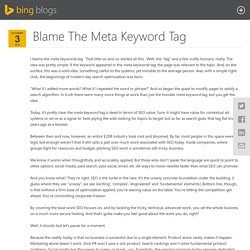
That little so-and-so started all this. Well, the “tag” and a few crafty humans, really. The idea was pretty simple. If the keyword appeared in the meta keywords tag, the page was relevant to the topic. And, on the surface, this was a solid idea. “What if I added more words? Today, it’s pretty clear the meta keyword tag is dead in terms of SEO value. Between then and now, however, an entire $20B industry took root and bloomed. We know it works when thoughtfully and accurately applied. And you know what? By covering the base work SEO focuses on, and by tackling the tricky, technical, advanced work, you set the whole business on a much more secure footing. Well, it should, but let’s pause for a moment. Because the reality today is that no business is successful due to a single element. Google vs. Bing vs. Yahoo for SEO.
We get this question all the time here at Netvantage: “We’re focusing a lot of our attention on Google.
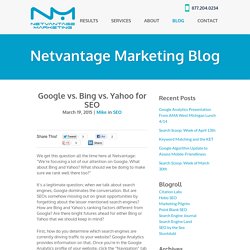
What about Bing and Yahoo? What should we be doing to make sure we rank well there too?” It’s a legitimate question; when we talk about search engines, Google dominates the conversation. 10 SEO Myths Reviewed. Myths in SEO run almost as deep as they do in Lock Ness and Area 51.
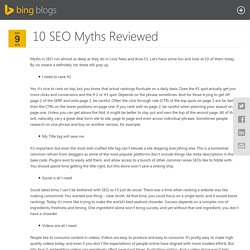
Let’s have some fun and look at 10 of them today. By no means a definitely list, these still pop up. SEO Ranking Factors for Bing USA 2013. Should Your SEO Strategy Include Yahoo and Bing? This post originally appeared on Inbound Insiders, a new section of Inbound Hub.

To read more content like this, subscribe to the Inbound Insiders section. When you hear the term "search engine," I'll bet the first company you think of is Google. It makes sense if you do. With nearly 6 billion searches every single day and over 2 trillion searches in 2013 alone, Google is pretty much a powerhouse. So when the term "search engine optimization" is mentioned, it would make sense that most people assume that simply means optimizing one’s site for Google ... right? While SEO is certainly about improving your site’s search results on Google, what about all of those other sites, like Bing and Yahoo? They’re search engines too, aren’t they? Because of the popularity of Google, many SEOs find themselves wondering if they should even bother with optimizing for Bing or Yahoo. Now here’s the long answer.
Does Bing like SEO? You bet your ahrefs we do… As with so many things in life, perspective is important.
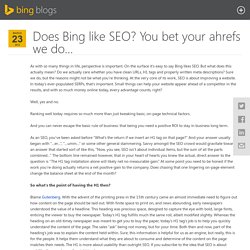
On the surface it’s easy to say Bing likes SEO. But what does this actually mean? Do we actually care whether you have clean URLs, H1 tags and properly written meta descriptions? Sure we do, but the reasons might not be what you’re thinking. MGC Spam Filtering. Web Spam Filtering. As I mentioned in the July 15 blog introducing Bing Index Quality, one of the key dimensions of our work is web spam detection and filtering.
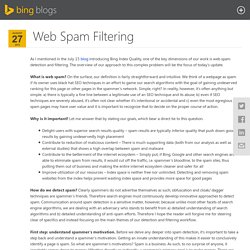
The overview of our approach to this complex problem will be the focus of today’s update. What is web spam? On the surface, our definition is fairly straightforward and intuitive. We think of a webpage as spam if its owner uses black hat SEO techniques in an effort to game our search algorithms with the goal of gaining undeserved ranking for this page or other pages in the spammer’s network. Simple, right? Filtering Low Quality Links in Bing SERP. The internet can often feel like a giant cesspool of low quality, illegal or malicious documents.
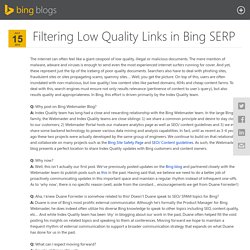
The mere mention of malware, adware and viruses is enough to send even the most experienced internet surfers running for cover. And yet, these represent just the tip of the iceberg of poor quality documents. Searchers also have to deal with phishing sites, fraudulent sites or sites propagating scams, spammy sites…. Well, you get the picture. On top of this, users are often inundated with non-malicious, but low quality/ low content sites like parked domains, 404s and cheap content farms.
Q: Why post on Bing Webmaster Blog? Q: Why now? Q: Aha, I knew Duane Forrester is somehow related to this! Q: What can I expect moving forward? To kick off the series, I thought it may be worthwhile to start by introducing our team in a bit more detail to set the context and narrative for future posts. Webmaster Guidelines - Bing Webmaster Tools. Bing SEO & Ranking Factors - The 'Big Bing' Is The Biggest Opportunity In SEO Today.
A lot of people do not pay attention to Bing SEO or ranking factors and purely focus on trying to rank in Google and nothing else.

However over the last couple of years Bing’s market share has been slowly increasing as Microsoft try to challenge Google in the search arena. If you were paying attention this week you will have noticed a fundamental shift in search that is going to affect us all. The Big Bing Has Already Happened.